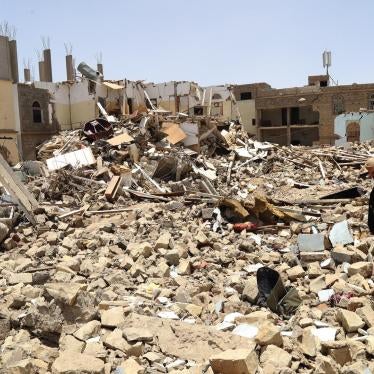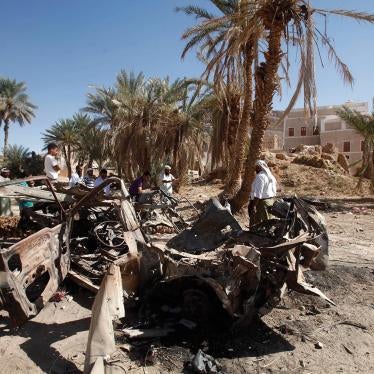(Geneva) – Yemen should investigate the allegations that its Republican Guard forces laid thousands of antipersonnel landmines in 2011, Human Rights Watch said today at the opening of an annual meeting of the 1997 Mine Ban Treaty. A November 2013 public communique from the prime minister’s office admitted that a “violation” of the Mine Ban Treaty occurred in 2011 during the popular uprising that led to the ouster of then-President Ali Abduallah Saleh.
The admission followed reports by Human Rights Watch and others that the former government’s Republican Guard forces laid thousands of antipersonnel mines at Bani Jarmooz, near Sana’a. It was the first admitted use of antipersonnel mines by a treaty member since the ban went into effect in 1999. To comply with its obligations, Yemen should mark the hazards, educate the population to the dangers, clear the affected areas, and provide assistance to victims.
“This is the most serious breach of the Mine Ban Treaty since it came into existence 14 years ago,” said Steve Goose, arms director at Human Rights Watch. “Yemen shouldn’t waste a minute in protecting people in the area by removing the landmines and making sure those responsible are heldaccountable.”
Yemen was among the first nations to sign the Mine Ban Treaty, on December 4, 1997, and became a state party on March 1, 1999, when the treaty entered into force. A total of 161 nations are party to the Mine Ban Treaty, which comprehensively prohibits antipersonnel landmines and requires governments to clear them and assist their victims.
Yemen’s mine use and how treaty members should respond is expected to be a key topic of discussion at the treaty’s annual meeting beginning December 2, 2013, at the United Nations in Geneva. The United States could also announce the outcome of its four-year-long review of its landmine policy, and its decision on whether the US should join the treaty. At the previous annual meeting, in November 2012, the US delegation stated that a decision would be made “soon.”
The Landmine Monitor 2013, a report released by the International Campaign to Ban Landmines (ICBL) in advance of the meeting, says that a number of encouraging records regarding landmines were set in 2012. They include the lowest number of new reported casualties since monitoring under the treaty began, the largest amount of landmine-affected land cleared, and the highest level of global funding for mine action. Other achievements documented include the removal of over 250,000 mines from the ground by mine clearance programs in 2012 and over 47 million stockpiled mines destroyed by states parties since the Mine Ban Treaty took effect in 1999.
“Mines are being removed from the ground at record rates, more mines are being destroyed before going into the ground, and there are fewer new casualties each year,” Goose said. “These are key indicators that the Mine Ban Treaty is ridding the world of these deadly weapons.”
Human Rights Watch is a founding member of the International Campaign to Ban Landmines, which received the 1997 Nobel Peace Prize, together with its coordinator, Jody Williams, for its efforts to bring about the Mine Ban Treaty and for its contributions to a new international diplomacy based on humanitarian imperatives.








